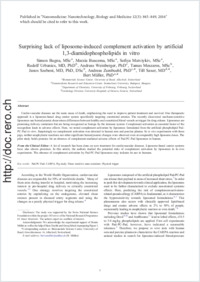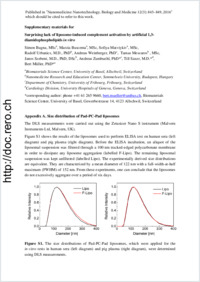Surprising lack of liposome-induced complement activation by artificial 1,3-diamidophospholipids in vitro
- Bugna, Simon Biomaterials Science Center, University of Basel, Allschwil, Switzerland
- Buscema, Marzia Biomaterials Science Center, University of Basel, Allschwil, Switzerland
- Matviykiv, Sofiya Biomaterials Science Center, University of Basel, Allschwil, Switzerland
- Urbanics, Rudolf Nanomedicine Research and Education Center, Semmelweis University, Budapest, Hungary
- Weinberger, Andreas Department of Chemistry, University of Fribourg, Switzerland
- Meszaros, Tamas Nanomedicine Research and Education Center, Semmelweis University, Budapest, Hungary
- Szebeni, Janos Nanomedicine Research and Education Center, Semmelweis University, Budapest, Hungary
- Zumbuehl, Andreas Department of Chemistry, University of Fribourg, Switzerland
- Saxer, Till Cardiology Division, University Hospitals of Geneva, Switzerland
- Müller, Bert Biomaterials Science Center, University of Basel, Allschwil, Switzerland
-
28.12.2015
Published in:
- Nanomedicine: Nanotechnology, Biology and Medicine. - 2016, vol. 12, no. 3, p. 845–849
English
Cardio-vascular diseases are the main cause of death, emphasizing the need to improve patient treatment and survival. One therapeutic approach is a liposome-based drug carrier system specifically targeting constricted arteries. The recently discovered mechano-sensitive liposomes use hemodynamic shear-stress differences between healthy and constricted blood vessels as trigger for drug release. Liposomes are promising delivery containers but are being recognized as foreign by the immune system. Complement activation as essential factor of the recognition leads to adverse effects. Here, we tested complement activation by liposomes formulated from the artificial phospholipid Pad-PC-Pad in vitro. Surprisingly no complement activation was detected in human sera and porcine plasma. In in vivo experiments with three pigs, neither anaphylactic reactions nor other significant hemodynamic changes were observed even at comparably high liposome doses. The pilot study holds promise for an absence of complement-mediated adverse effects of Pad-PC-Pad liposomes in human.
- Faculty
- Faculté des sciences et de médecine
- Department
- Département de Chimie
- Language
-
- English
- Classification
- Biological sciences
- License
- License undefined
- Identifiers
-
- RERO DOC 260702
- DOI 10.1016/j.nano.2015.12.364
- Persistent URL
- https://folia.unifr.ch/unifr/documents/304879
Other files
Statistics
Document views: 68
File downloads:
- zum_sll.pdf: 122
- zum_sll_sm.pdf: 151

